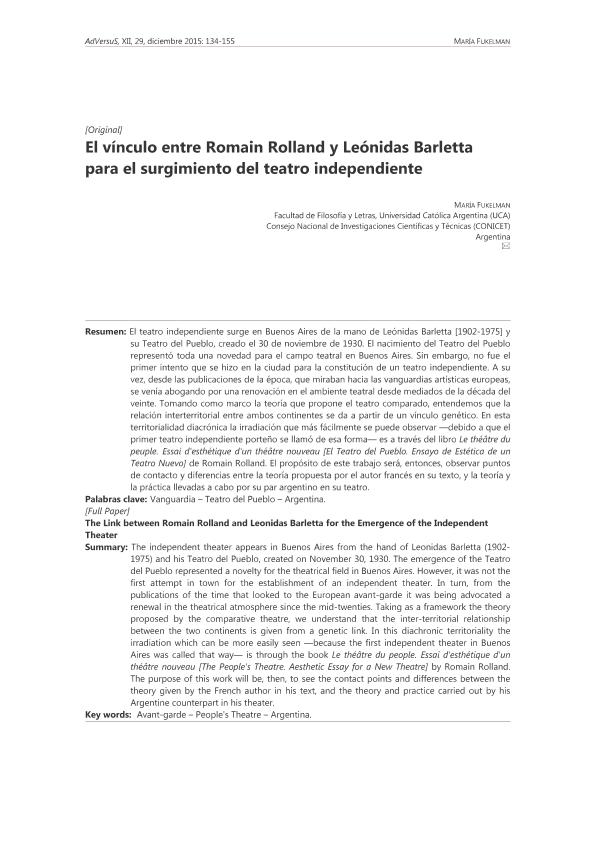Mostrar el registro sencillo del ítem
dc.contributor.author
Fukelman, María

dc.date.available
2019-03-07T20:13:13Z
dc.date.issued
2015-12
dc.identifier.citation
Fukelman, María; El vínculo entre Romain Rolland y Leónidas Barletta para el surgimiento del teatro independiente; Istituto Italo-argentino di Ricerca Sociale. Centro di Ricerca Semiotica; Adversus; 12; 29; 12-2015; 134-155
dc.identifier.issn
1669-7588
dc.identifier.uri
http://hdl.handle.net/11336/71219
dc.description.abstract
El teatro independiente surge en Buenos Aires de la mano de Leónidas Barletta [1902-1975] y su Teatro del Pueblo, creado el 30 de noviembre de 1930. El nacimiento del Teatro del Pueblo representó toda una novedad para el campo teatral en Buenos Aires. Sin embargo, no fue el primer intento que se hizo en la ciudad para la constitución de un teatro independiente. A su vez, desde las publicaciones de la época, que miraban hacia las vanguardias artísticas europeas, se venía abogando por una renovación en el ambiente teatral desde mediados de la década del veinte. Tomando como marco la teoría que propone el teatro comparado, entendemos que la relación interterritorial entre ambos continentes se da a partir de un vínculo genético. En esta territorialidad diacrónica la irradiación que más fácilmente se puede observar —debido a que el primer teatro independiente porteño se llamó de esa forma— es a través del libro Le théâtre du peuple. Essai d'esthétique d'un théâtre nouveau [El Teatro del Pueblo. Ensayo de Estética de un Teatro Nuevo] de Romain Rolland. El propósito de este trabajo será, entonces, observar puntos de contacto y diferencias entre la teoría propuesta por el autor francés en su texto, y la teoría y la práctica llevadas a cabo por su par argentino en su teatro.
dc.description.abstract
The independent theater appears in Buenos Aires from the hand of Leonidas Barletta (1902-1975) and his Teatro del Pueblo, created on November 30, 1930. The emergence of the Teatro del Pueblo represented a novelty for the theatrical field in Buenos Aires. However, it was not the first attempt in town for the establishment of an independent theater. In turn, from the publications of the time that looked to the European avant-garde it was being advocated a renewal in the theatrical atmosphere since the mid-twenties. Taking as a framework the theory proposed by the comparative theatre, we understand that the inter-territorial relationship between the two continents is given from a genetic link. In this diachronic territoriality the irradiation which can be more easily seen ―because the first independent theater in Buenos Aires was called that way― is through the book Le théâtre du people. Essai d'esthétique d'un théâtre nouveau [The People's Theatre. Aesthetic Essay for a New Theatre] by Romain Rolland. The purpose of this work will be, then, to see the contact points and differences between the theory given by the French author in his text, and the theory and practice carried out by his Argentine counterpart in his theater.
dc.format
application/pdf
dc.language.iso
spa
dc.publisher
Istituto Italo-argentino di Ricerca Sociale. Centro di Ricerca Semiotica
dc.rights
info:eu-repo/semantics/openAccess
dc.rights.uri
https://creativecommons.org/licenses/by-nc-sa/2.5/ar/
dc.subject
Barletta, Leonidas
dc.subject
Rolland, Romain
dc.subject
Teatro del Pueblo
dc.subject
Teatro Independiente
dc.subject
Vanguardia
dc.subject
Argentina
dc.subject.classification
Otras Artes

dc.subject.classification
Arte

dc.subject.classification
HUMANIDADES

dc.title
El vínculo entre Romain Rolland y Leónidas Barletta para el surgimiento del teatro independiente
dc.title
The Link between Romain Rolland and Leonidas Barletta for the Emergence of the Independent Theater
dc.type
info:eu-repo/semantics/article
dc.type
info:ar-repo/semantics/artículo
dc.type
info:eu-repo/semantics/publishedVersion
dc.date.updated
2019-03-07T15:13:12Z
dc.journal.volume
12
dc.journal.number
29
dc.journal.pagination
134-155
dc.journal.pais
Argentina

dc.journal.ciudad
Ciudad Autónoma de Buenos Aires
dc.description.fil
Fil: Fukelman, María. Consejo Nacional de Investigaciones Científicas y Técnicas; Argentina. Pontificia Universidad Católica Argentina "Santa María de los Buenos Aires". Facultad de Filosofía y Letras; Argentina
dc.journal.title
Adversus
dc.relation.alternativeid
info:eu-repo/semantics/altIdentifier/url/http://www.adversus.org/indice/nro-29/portada.htm
dc.relation.alternativeid
info:eu-repo/semantics/altIdentifier/url/http://www.adversus.org/indice/nro-29/articulos/XII2907.pdf
Archivos asociados
